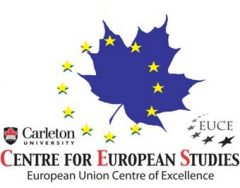
In 2006, Carleton’s Centre for European Studies was selected by the European Commission as a European Union Centre of Excellence (EUCE) and as Network Coordinator for all of the Canadian EUCEs. Between 2006 and 2016, the EUCE received support from the European Union under its EU Centres of Excellence (EUCE) program to support its activities. Carleton University also has provided generous support for the project.
The EUCE focused its activities on outreach to defined constituencies external to the university; intensified cooperation with professional schools and their students within the university; promotion of the first-hand student experience in the EU; and expansion of contacts between Canadian scholars and European partners. The EUCE’s external outreach addressed the policy and business communities, non-governmental organizations (NGOs), high school students and teachers, and broader civil society. Specially-designed outreach vehicles were created for those audiences, including focused policy workshops, policy briefs, multimedia, and specialized lectures; and for high school students and teachers outreach included a teachers’ workshop, lesson plans, and in-class sessions. Web-based delivery techniques (webinars, videorecordings, videolinks, podcasts) and effective media outreach were used as cost effective tools to reach an expanded geographic audience as well. An intensified use of wider range of social media allowed EUCE to engage youth effectively.
The EU-focused academic programs were reinforced at all levels (Bachelor, Master, Ph.D.), but with a strong emphasis on students and faculty in professional schools by offering new courses, adding EU material to existing courses, supporting visits by European scholars, and reaching out to regional universities and colleges. European visitors participated in teaching and in virtual and on-site outreach events. Enhanced linkages with European partners, especially EU-funded programs, as well as with other EU Centers abroad, enabled the EUCE to deliver deeper expertise in its outreach and teaching programs. The EUCE also provided grants for graduate students to conduct research in the EU and to participate in the EU Study Tour and Internship program.
The EUCE’s research activities for the years 2013-2016 revolved around four European Research Nodes (ERNs). Each ERN brought together faculty and students whose work had a thematic link to the ERN.
ERN 1: The EU as Global Actor and EU-Canada Relations (ERN Coordinators: Joan DeBardeleben and David Long)
ERN 2: Citizenship and Social Integration: Between National and Transnational Society (ERN Coordinators: Martin Geiger and Achim Hurrelmann)
ERN 3: Innovation in Environmental Policy in Europe and Canada (ERN Coordinator: Inger Weibust)
ERN 4: The Political Economy of European Integration: Regional and Economic Dimensions (ERN Coordinator: Crina Viju)
For more information about ERNs click here.
In November 2016, with the termination of the EU-supported EUCE program, EUCE Carleton completed its activities. However, from September 2016, the Centre for European Studies at Carleton University has been able to continue an active program of EU-related outreach, educational, and research activities through it newly-funded Jean Monnet EU Centre of Excellence.
